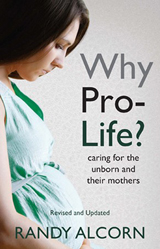 Some Christians may think, “Believers don’t have abortions, only un-churched people do.” This simply isn’t true. In fact, 43 percent of women obtaining abortions identify themselves as Protestant, and 27 percent identify themselves as Catholic. So two-thirds of America’s abortions are obtained by those with a Christian affiliation. As I share in my book Why ProLife?, one of every five US abortions—about a quarter-million a year—are performed on women who identify themselves as born-again or evangelical Christians. [1]
Some Christians may think, “Believers don’t have abortions, only un-churched people do.” This simply isn’t true. In fact, 43 percent of women obtaining abortions identify themselves as Protestant, and 27 percent identify themselves as Catholic. So two-thirds of America’s abortions are obtained by those with a Christian affiliation. As I share in my book Why ProLife?, one of every five US abortions—about a quarter-million a year—are performed on women who identify themselves as born-again or evangelical Christians. [1]
Many church-attending women, younger and older, have had abortions. Many church-attending men got those women pregnant and either pressured, encouraged, or at least agreed with the mother to abort their children.
EPM staff member Kathy Norquist, who prays with a group in front of Oregon’s largest abortion clinic, shares stories that reflect the reality of these statistics:
Talking with Christians Who Come to Abortion Clinics
Once a month, some friends and I stand outside the abortion clinic praying, holding signs, and seeking to offer alternatives to men and women who choose to abort their babies. It’s a difficult place to go to, and I often don’t look forward to it. But once I’m there, it becomes a powerful time of intercession and opportunities and the Lord blesses us in many ways.
Sadly, there are many Christians who come to the clinic for abortions or to assist others in getting them. Here are just a few of our encounters:
One young woman who already had an abortion was coming back for a checkup. It was heartbreaking to hear she was a Christian and involved in a church. We were able to offer her post-abortion healing information to deal with the obvious guilt she was carrying.
One of our women spoke with a young girl and her mother (presumably), parked on the street. “I could tell her conscience was working, because she said things like ‘This was such a hard decision for me. You don't know my situation. I put a lot of thought into this and it’s the best decision for me and my baby. I'm a Christian; I'm with you in spirit, but respect my decision and don't keep talking to me, and God bless you, Ma'am!’, shutting her eyes to block me out. I wasn't harassing her, but kept up with what I hoped was just gentle, logical suggestions, like adoption.”
Another morning we spoke with a grandmother who had brought her granddaughter for an abortion. She told us she was very much against it, but couldn’t talk her granddaughter out of it. Yet she was the one who drove her to the clinic. We told her to be prepared that one day her granddaughter might very well have anger toward her for facilitating her decision by driving her. It turns out the grandmother was a Christian, involved in an evangelical church which has a post-abortion Bible study for women, and her husband is a church planter!
We spoke with a woman who was just getting into her car. She was a committed believer who had brought her Christian daughter to get an abortion. The mother was adamantly opposed to the abortion and tried to talk with her daughter for days, but the daughter was determined. The mother was heartsick. Yet, she thought that even though she desperately didn’t want her daughter to go ahead with it, she had to bring her to support her and not let her go through it alone.
I believe this mom sincerely thought she had no other choice and was doing the right thing by her daughter. But I don’t think she truly believed it was a child (who at the moment of conception has a unique DNA with enough information to fill 50 sets of encyclopedias), a human life worthy of protection just like all of us. Because if she did believe it, she couldn’t have any part of helping her daughter kill her own grandchild. What would have happened if she had refused to bring her daughter? Possibly the daughter would have seen her mom’s commitment and changed her mind, possibly she wouldn’t have found another way to get there, possibly…we just don’t know, but her mom would have done the right thing.
We’ve encountered several people who said they were Christians, yet either brought someone or were getting an abortion themselves. Silence in the church sends a message that it’s okay. This hurts women who could be saved from an abortion decision, resulting in life for innocent preborn children. Abortion really does kill children.
Note: EPM has officially become the sponsor for this outreach ministry. If you’re in the Portland area and would like to participate in prayer and presence, please contact me via EPM, and I will connect you with the right people. It would be a great encouragement to us if God were to lead you to this ministry!
Church leaders should take responsibility for the sad state of the church just described. The abortion issue isn’t about the church needing to speak to the world. It’s about the church needing to speak to itself first, and then to the world. Sanctity of Human Life Sunday is a great starting place, but it’s not enough. We must address the pervasive prochoice arguments that daily bombard Christians.
We must not hold back from speaking the truth just because there’s no consensus about abortion in our church. Consensus may never come—but our job is to still teach what the Bible says in no uncertain terms. And knowing that when we address this subject many women who’ve had abortions will be touched, we must offer forgiveness and emotional support.
Some pastors fear “laying a guilt trip” on women in our churches who’ve had abortions. On the contrary, we must address it for their sake. If we don’t speak out, our people will continue to suffer—and continue to kill their babies and assist others in killing their babies—without knowing the forgiveness and healing of Christ.
Pastors should resist the temptation to decide for their people not to see pictures that show the reality of what abortion is. No one should be forced to view such pictures, but neither should others be deprived of the opportunity. By not showing actual pictures of abortion, we keep people from emotionally experiencing the children’s humanity and the horrors of abortion, and leave them liable to consider abortion when they, their family, or friends face an unwanted pregnancy. (We should carefully prepare our audience, allowing people to look away or close their eyes without having to leave or call attention to themselves.)
As Christian leaders, we must realize that we’ll be held accountable, both in this life and in eternity, for how we deal with this issue. We need to take deliberate and significant measures to stop the killing, to minister to our hurting women, and to make a difference in our community. The desire to be popular and avoid people’s disapproval is a common reason for church leaders to hold back in pro-life efforts. But for every reason we have, we should be ready to answer a question on the last day: “Was that reason more important than the lives of all those children I created in my image?”
Browse more prolife articles and resources, as well as see Randy's books Pro-Choice or Pro-Life: Examining 15 Pro-Choice Claims, Why ProLife? and ProLife Answers to ProChoice Arguments.
[1] Rachel K. Jones, Lawrence B. Finer, and Susheela Singh, “Characteristics of U.S. Abortion Patients, 2008,” Guttmacher Institute, May 2010.




